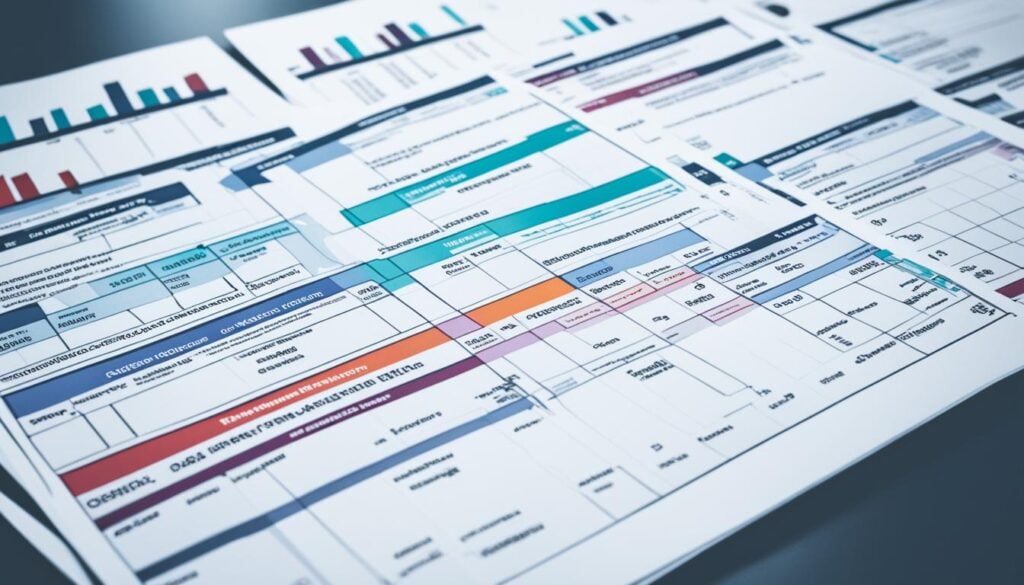When it comes to optimizing your business operations and gaining a competitive edge in Singapore’s dynamic market, implementing the right software solutions is crucial. Two systems that stand out in enhancing efficiency and performance are Enterprise Resource Planning (ERP) and Enterprise Performance Management (EPM). Both have their distinct benefits and can empower Singaporean enterprises to achieve their goals.
ERP software integrates and connects various functions of your business, including financials, supply chain management, CRM, and HR. This streamlined approach ensures a smooth flow of information and enables you to make data-driven decisions for improved operational efficiency.
EPM software, also known as CPM software, on the other hand, focuses on strategic planning, budgeting, forecasting, and performance analysis. By utilizing EPM tools, you can align your business objectives, identify growth opportunities, and optimize your financial performance.
As you strive to create a competitive advantage, understanding the differences and benefits of Enterprise Performance Management and the best ERP software in Singapore is essential. This article will provide you with valuable insights to help you make an informed decision about implementing the right system for your specific needs.
Table of Content:
Table of Content
Understanding the Fundamentals of ERP and EPM
ERP systems are key for integrating important functions of businesses, such as financials, asset management, supply chain management, CRM, and HR. They facilitate the flow of information within an organization, ensuring smooth operations and streamlined business processes. These core functions of ERP software are essential for the efficient functioning of Singaporean enterprises.
On the other hand, EPM software focuses on strategic planning, budgeting, forecasting, and performance analysis. By leveraging advanced analytics and data-driven insights, EPM helps businesses make informed decisions and optimize their performance to achieve their desired goals.
Both ERP and EPM contribute to the seamless information flow across various business processes. ERP ensures that every department in the enterprise has access to real-time data, enabling effective collaboration and decision-making. EPM, on the other hand, empowers organizations to strategically plan and analyze their performance to drive growth and success.
These software systems are indispensable tools for Singaporean enterprises of all sizes and industries to improve their business operations, enhance their decision-making capabilities, and stay competitive in the dynamic business landscape.
The Evolution of ERP and EPM
The development of ERP (Enterprise Resource Planning) and EPM (Enterprise Performance Management) has undergone a remarkable transformation over the years. These software solutions have evolved from basic accounting software and spreadsheets to modern cloud-based platforms, revolutionizing the way businesses operate and make decisions.
ERP systems have witnessed significant advancements, becoming more comprehensive by integrating various functions within a business. In the past, businesses used separate software systems for financial management, supply chain management, CRM, and HR. With ERP, all these functions are seamlessly integrated, enabling businesses to streamline processes, eliminate data silos, and improve overall efficiency.
Similarly, the evolution of EPM solutions has been driven by the shift towards cloud-based platforms. Traditionally, EPM tools relied on on-premises software, which presented limitations in terms of scalability and accessibility. By transitioning to the cloud, businesses now have the flexibility to access EPM functionalities from anywhere, at any time. Cloud-based EPM solutions offer enhanced collaboration, reduced maintenance costs, and the ability to leverage real-time data for faster decision-making.
Embracing cloud-based ERP and EPM solutions has provided businesses with numerous benefits. Lower upfront costs, compared to on-premises systems, make these cloud-based solutions an attractive choice for businesses of all sizes. The scalability of cloud platforms allows organizations to easily expand their operations and adapt to changing business needs. Additionally, cloud-based solutions offer seamless updates and maintenance, eliminating the need for businesses to invest in costly system upgrades.
The historical overview of ERP and EPM showcases how these software solutions have matured to meet the evolving needs of businesses. By leveraging cloud-based ERP and EPM systems, Singaporean enterprises can drive efficiency, boost performance, and gain a competitive edge in today’s digital landscape.
Key Differences between ERP and EPM
While both ERP and EPM play vital roles in business operations, they have distinct focus areas and implementation complexities that set them apart. Understanding these differences is essential for Singaporean enterprises to make informed decisions about which system is best suited for their specific needs.
ERP, or Enterprise Resource Planning, primarily focuses on integrating and streamlining various business processes, such as financials, supply chain management, CRM, and HR. It serves as a centralized system that facilitates the flow of information within the organization, enabling efficient coordination and decision-making. However, implementing an ERP system can be complex due to the need for customization and data migration.
EPM, or Enterprise Performance Management, has a narrower focus on strategic planning, budgeting, forecasting, and performance analysis. It is designed to help businesses optimize their performance and make informed decisions. EPM requires expertise in financial analysis and modeling, as it provides targeted reporting and analysis for specific business functions.
When it comes to reporting scope, ERP generally offers a broader range of reporting capabilities that impact overall organizational strategy and performance. On the other hand, EPM provides more targeted reporting and analysis for specific business functions, allowing for in-depth insights and actionable recommendations.
The organizational impact of ERP and EPM also differs. ERP has a holistic impact on the entire organization, as it integrates multiple functions and enables cross-functional collaboration. It influences operational efficiency and strategic decision-making at all levels. In contrast, EPM is more focused on financial planning and analysis, making its impact more concentrated in the finance department and related functions.
When ERP Meets EPM
ERP and EPM systems complement each other seamlessly, offering immense value to businesses in Singapore. By integrating the functionalities of ERP and EPM, organizations can align their operational planning and financial planning, resulting in more efficient resource allocation and improved decision-making.
Imagine this scenario: your business is utilizing an ERP system that provides real-time data on inventory levels and production capacity. Meanwhile, your EPM system enables financial planning and forecasting based on that data. With the combination of ERP and EPM, you can gain a comprehensive view of your operations and make informed decisions that drive growth and profitability.
The integration of ERP and EPM empowers businesses to optimize their operational planning and financial planning simultaneously. By leveraging ERP’s capabilities in capturing and analyzing operational data, and EPM’s strength in financial analysis and forecasting, organizations can achieve a holistic view of their operations.
Let’s take a moment to visualize the benefits of this integration with an image:
The image above illustrates the meeting point of operational planning and financial planning, made possible through the integration of ERP and EPM. This converged approach allows for a comprehensive understanding of how operational decisions impact financial outcomes and vice versa.
With ERP and EPM collaborating harmoniously, businesses in Singapore can optimize their operations, capitalize on growth opportunities, and stay one step ahead in their respective industries.
Leveraging the Combination of ERP and EPM
Leading businesses have successfully leveraged the combination of ERP and EPM to achieve their strategic goals. By integrating these systems, companies gain a holistic view of their operations, enabling them to make data-driven decisions and optimize performance.
Case studies illustrate the effectiveness of integrating ERP and EPM solutions in improving financial management, streamlining processes, and driving growth. Discover Financial Services, Hormel Foods, and Taylor Corporation are notable examples of organizations that have successfully implemented ERP and EPM systems to achieve their business objectives.
Discover Financial Services, a leading financial institution, utilized ERP and EPM to streamline their financial processes and enhance reporting capabilities, resulting in improved decision-making and overall business performance.
Hormel Foods, a global food company, integrated ERP and EPM systems to optimize their supply chain and inventory management, enabling them to make data-driven operational decisions and efficiently meet customer demands.
Taylor Corporation, a print and marketing solutions provider, leveraged ERP and EPM to achieve cost savings and streamline their financial planning and analysis processes, leading to increased profitability and sustainable growth.
These real-life examples serve as inspiration for other Singaporean enterprises seeking to leverage ERP and EPM for their own competitive advantage. By adopting these integrated systems and aligning strategic planning, businesses can drive efficiency, improve decision-making, and achieve their business goals.
Making the Right Choice for Your Business in Singapore
When it comes to choosing between ERP and EPM for your business in Singapore, there are several considerations to keep in mind. Factors such as your business size, industry requirements, and specific needs play a crucial role in determining the right system for you.
For small businesses with simpler operations, ERP might be the most suitable option. ERP systems can integrate and manage core functions such as financials, supply chain management, CRM, and HR, providing an all-in-one solution for streamlining operations.
On the other hand, larger businesses with complex financial planning and analysis needs may find that EPM systems are better suited to their requirements. EPM focuses on strategic planning, budgeting, forecasting, and performance analysis, allowing businesses to make informed decisions and optimize their performance.
To make the right choice for your business, it is essential to evaluate your specific needs and operational dynamics. Consider the size of your business and the complexity of your financial planning and analysis requirements. Additionally, take into account the unique needs of your industry and any specific challenges you may face.
By carefully assessing these factors, you can align your technology investment with your business goals and choose the system that will best support your operations in Singapore.
Future Trends and Innovations
The future of ERP (Enterprise Resource Planning) and EPM (Enterprise Performance Management) technologies holds exciting possibilities for businesses in Singapore. As technology continues to advance, there will be innovations in areas such as AI-driven analytics, predictive modeling, and real-time performance monitoring, revolutionizing the way businesses operate and make informed decisions. These advancements will enable Singaporean enterprises to optimize their operations, stay competitive, and achieve sustainable growth in the ever-evolving business landscape.
AI-driven analytics will play a key role in the future of ERP and EPM. With the power of artificial intelligence, businesses will gain deeper insights into data, enabling them to uncover hidden patterns, identify trends, and make more accurate predictions. This will empower companies to take proactive measures and make informed decisions, improving overall performance and driving success.
Predictive modeling will also become increasingly important. By analyzing historical data and utilizing advanced algorithms, businesses will be able to forecast future outcomes and anticipate potential challenges or opportunities. With this foresight, Singaporean enterprises can better allocate resources, adapt to changing market conditions, and optimize their strategies for long-term success.
Furthermore, real-time performance monitoring will enable businesses to have up-to-date visibility into their operations. With the integration of IoT devices and sensors, key performance indicators can be tracked in real-time, allowing for immediate intervention and adjustments as needed. This level of transparency and agility will be crucial for Singaporean enterprises to stay ahead in a rapidly changing business environment.






















































